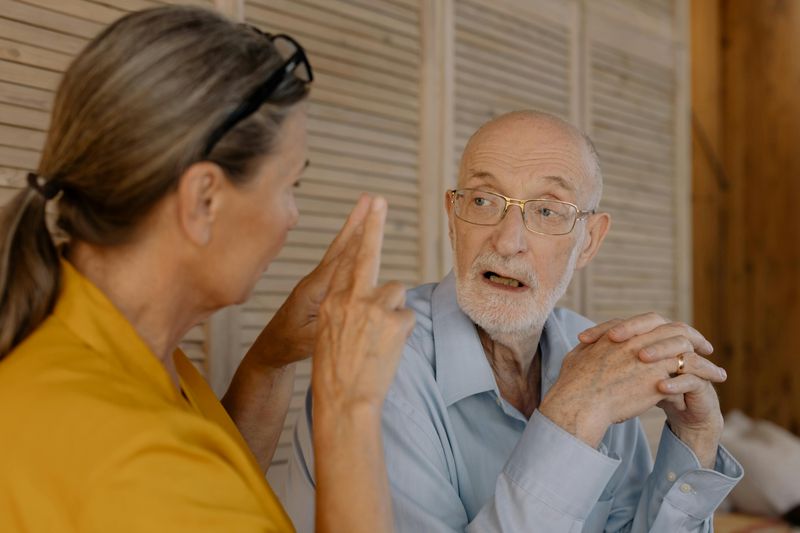Creating deep emotional bonds takes more than just being together—it requires mindful actions that show you truly care. These small but mighty gestures build the foundation for relationships where both people feel seen, heard, and valued. The beauty lies in their simplicity: tiny moments of connection that cost nothing but mean everything.
1. Say “I appreciate you” often
Those three little words carry remarkable power. When you tell someone you appreciate them, you’re acknowledging their value beyond what they do for you. You’re recognizing their essence.
The phrase works wonders because it’s specific to the person, not just their actions. It creates a moment of genuine connection that resonates deeply. Try saying it during ordinary moments—while cooking dinner together or during a car ride.
Make it a habit to express appreciation without expecting anything in return. The magic happens when appreciation becomes part of your daily language, creating an environment where both people feel valued simply for being themselves.
2. Make eye contact when listening
Looking into someone’s eyes during conversation creates an invisible bridge between souls. This simple act signals that nothing else matters more than this moment with them. Your gaze says: “I’m fully here with you.”
Many of us habitually glance at phones or scan the room while others speak. Breaking this habit transforms how others experience being with you. True eye contact requires practice—it might feel intense at first.
Start with short bursts if needed, gradually building your comfort. The vulnerability of eye contact deepens trust because it’s impossible to fake presence when your eyes are engaged. This quiet connection speaks volumes without requiring a single word.
3. Give hugs without needing a reason
Surprise embraces speak a language all their own. A spontaneous hug says “I thought of you” and “your presence matters to me” without requiring words. The beauty of these unexpected moments is how they break through daily routines.
Physical touch releases oxytocin—the bonding hormone that creates feelings of trust and connection. When offered freely without expectation, hugs become gifts rather than transactions. Remember that quality matters more than quantity.
A twenty-second hug has been shown to reduce stress hormones and increase feelings of security. Try offering an embrace when your person walks through the door, during a quiet moment, or just because the thought occurs to you. These touchpoints become anchors in the relationship.
4. Send small “thinking of you” messages
Tiny digital notes create ripples of connection throughout ordinary days. A quick text saying “this song made me think of you” or “hope your meeting went well” serves as a gentle reminder that someone carries you in their thoughts even when apart.
These messages work because they’re unexpected and ask nothing in return. They simply say: I paused my day to think about yours. The key is keeping them genuine rather than obligatory.
Send a photo of something that reminded you of them, share a memory that popped up, or simply check in during a moment you know might be challenging. These small touchpoints create an invisible thread of connection that strengthens over time, weaving your lives together even across distance.
5. Ask about their day—and really listen
Genuine curiosity transforms routine exchanges into moments of true connection. When you ask “How was your day?” with authentic interest, you create space for someone to share their world with you. The magic happens in how you receive their words.
Put down your phone. Turn your body toward them. Nod and respond with small encouragements that show you’re tracking their story. Ask follow-up questions about parts that seemed meaningful to them, not just the parts interesting to you.
Remember details they share so you can check back later: “How did that situation with your coworker resolve?” This kind of attentive listening makes people feel seen in a world where everyone is typically rushing to speak next rather than understand.
6. Express gratitude for the little things
Noticing small efforts changes everything. When someone refills your water glass, hangs up your coat, or remembers how you like your coffee—acknowledging these tiny gestures builds a culture of appreciation. These moments often pass invisibly in relationships.
Bringing them into the light through simple thanks creates a powerful feedback loop. The person feels seen for their efforts, making them more likely to continue these thoughtful actions. Start by thanking your person for one small thing daily.
Be specific: “Thank you for starting the dishwasher without being asked” means more than a generic “thanks for helping.” This practice gradually shifts your attention toward what’s going right rather than what’s missing, creating a relationship atmosphere rich with recognition and warmth.
7. Offer physical touch (a hand squeeze, shoulder rub)
Small touches speak volumes when words fall short. A gentle hand on the back while passing in the hallway, fingers brushing across shoulders during a stressful moment, or holding hands while walking—these brief connections ground us in our bodies and each other.
Physical touch activates our parasympathetic nervous system, literally calming our bodies. It signals safety and belonging on a primal level. The key is offering touch that feels supportive rather than demanding.
Notice which forms of contact your person responds to most positively. Some melt into shoulder rubs while others prefer hand-holding or arm touches. These momentary connections create an unspoken language between you, offering reassurance and presence without requiring a single word.
8. Check in with “How are you feeling?” not just “How are you?”
The slight shift in wording opens doors to deeper sharing. “How are you?” typically triggers automatic responses like “fine” or “good.” Adding the word “feeling” invites reflection about emotional states rather than circumstances.
Ask this question when you have time to really hear the answer. Create a judgment-free zone where all emotions are welcome—not just the pleasant ones. Your calm presence during difficult feelings builds tremendous trust.
Follow up with “Tell me more about that” rather than rushing to fix or relate. Sometimes people need to process out loud without seeking solutions. This simple question, asked regularly with genuine interest, creates a relationship where emotional honesty becomes natural rather than something saved for special occasions or crises.
9. Share compliments sincerely
Heartfelt praise nourishes the soul like nothing else. The key word is sincere—people can sense when compliments are offered merely as social currency rather than genuine appreciation. Notice what makes your person uniquely themselves, then put it into words.
Go beyond appearance to recognize character qualities, efforts, and growth. “I admire how you always look for solutions instead of complaining” carries more weight than generic praise. Specific compliments show you’re truly paying attention.
Timing matters too—offer recognition when it won’t embarrass them or seem transactional. The goal isn’t to get something in return but to verbalize your genuine admiration. These affirmations become building blocks of confidence and security within the relationship.
10. Make space for silence and presence
Comfortable silence creates a rare kind of intimacy. In a world that constantly demands words and action, simply being together without needing to fill the air becomes precious. These quiet moments allow for a different kind of connection.
Resist the urge to reach for your phone during lulls in conversation. Instead, breathe into the shared silence and notice how it feels to simply exist together. Some of life’s most connecting moments happen without words—watching a sunset side by side or sitting near each other reading.
The gift of your undivided presence—without distraction or agenda—creates a sanctuary of acceptance. This shared quiet builds a foundation of comfort where neither person feels pressured to perform or entertain, allowing true relaxation together.
11. Validate their emotions without trying to fix them
Holding space for feelings is one of love’s greatest gifts. When someone shares their emotions, our first instinct is often to solve the problem or cheer them up. True validation means simply acknowledging their experience: “That sounds really frustrating” or “I can see why you’d feel that way.”
This approach honors their emotional reality without rushing to change it. People rarely need instant solutions—they need to feel understood first. Try reflecting back what you hear: “It sounds like you felt overlooked when they didn’t acknowledge your contribution.”
Ask if they want advice before offering it. Sometimes a simple “I’m here with you in this” provides more comfort than the cleverest solution. This practice builds emotional safety where all feelings can be expressed without judgment.
12. Do small acts of service (brew coffee, tidy up)
Tiny thoughtful actions speak volumes about how much you care. Warming up the car on a cold morning, bringing a glass of water without being asked, or handling a chore they usually do—these gestures say “I’m thinking about making your life easier.”
The power lies in noticing what would help before being asked. This requires paying attention to their routines, preferences, and current challenges. The goal isn’t to keep score but to create moments of unexpected care.
These small kindnesses work because they reduce the mental load your person carries. Even five-second gestures like hanging up a towel or refilling something low communicate a powerful message: “Your comfort matters to me.” These actions, accumulated over time, create a foundation of practical care that supports emotional connection.
13. Recall and mention details they’ve shared
Remembering small details shows someone they’re truly heard. When you reference something they mentioned days or weeks ago—a coworker’s name, an upcoming deadline, or a small worry—you demonstrate that their words matter enough to store in your memory.
This practice creates a powerful sense of being known. Try keeping mental notes of important details: their favorite meal when sick, an upcoming presentation they’re nervous about, or the name of their childhood pet. Following up shows you’ve been carrying them in your thoughts.
The magic happens when you mention these details naturally in conversation: “How did that doctor appointment go yesterday?” or “Did you ever finish that book you were excited about?” These callbacks create continuity in your connection, weaving your conversations into an ongoing tapestry rather than isolated exchanges.
14. Celebrate their wins, big or small
Being someone’s biggest fan creates unshakable bonds. When good things happen—whether landing a promotion or finally mastering a recipe—your enthusiastic response amplifies their joy. Genuine celebration means matching or exceeding their excitement level.
Look them in the eyes, put down distractions, and respond with energy: “That’s amazing! Tell me everything!” Small wins deserve recognition too—completing a tough workout, handling a difficult conversation well, or finishing a book.
Research shows that how we respond to shared good news actually predicts relationship satisfaction better than how we handle problems. This “active constructive responding” means asking questions, showing interest, and revisiting their success later. Your celebration creates a relationship where achievements are sweeter because they’re shared.
15. Say “I love you” in words and actions
Those three words never lose their power when spoken with presence. Looking into someone’s eyes while saying “I love you” creates a moment of pure connection. The verbal affirmation matters—even when you think they already know.
Actions that say “I love you” without words matter equally: making their favorite meal after a hard day, remembering to grab something they need without being asked, or simply stopping to really see them during a busy moment. These demonstrations speak to different parts of the heart.
The combination creates a full-spectrum experience of being loved. Try expressing love in unexpected moments, not just during greetings and goodbyes. A random text, a note left where they’ll find it later, or whispering it during an ordinary moment—these unexpected expressions often touch the heart most deeply.















